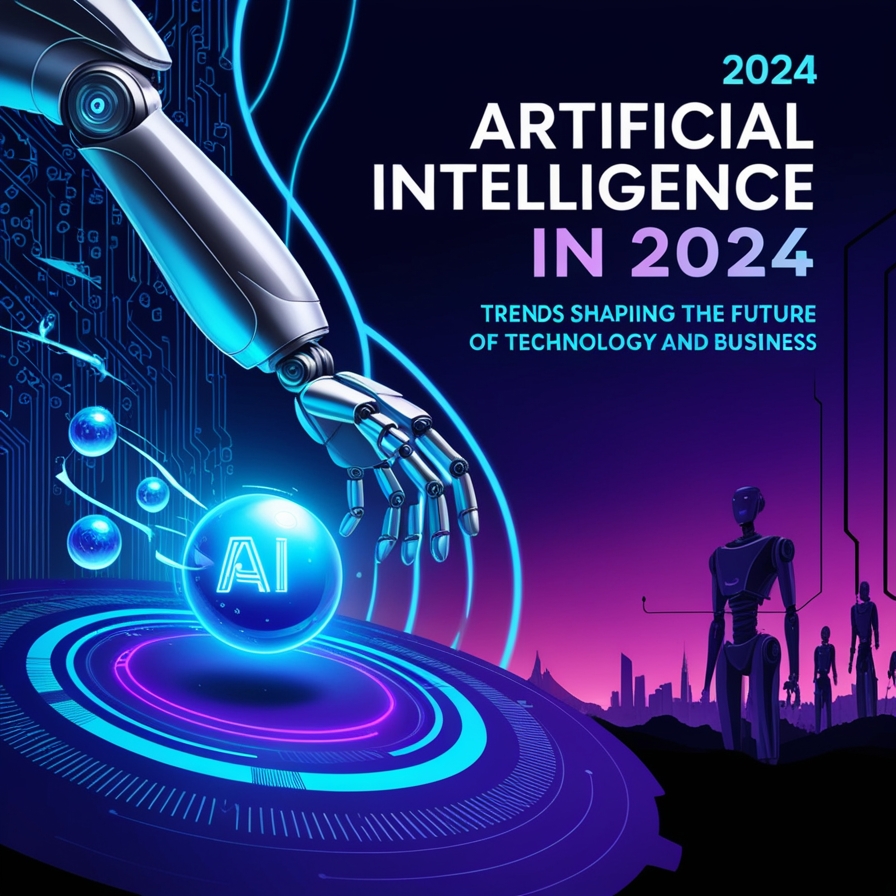Introduction
Artificial Intelligence (AI) is no longer a futuristic concept—it’s a transformative force reshaping industries across the globe. In 2024, AI is set to become even more integrated into daily business operations, personal lives, and technological advancements. From enhancing customer experiences to driving automation in complex systems, the role of AI is expanding rapidly. Let’s explore the key trends and innovations in AI that will shape business strategies and technological development in 2024.
Key AI Trends in 2024
- AI-Driven Automation
One of the most significant shifts AI will bring to businesses in 2024 is the increased use of automation. AI-powered systems are capable of automating tasks across industries, from manufacturing and logistics to customer service and marketing. Businesses will increasingly rely on AI to optimize workflows, improve operational efficiency, and reduce human error, allowing employees to focus on higher-value tasks. - AI in Customer Service: Chatbots and Virtual Assistants
AI-driven chatbots and virtual assistants are becoming more sophisticated in their interactions with customers. These tools are now able to handle complex queries, personalize responses, and even resolve customer issues without human intervention. In 2024, we’ll see a rise in AI-powered customer service solutions that can not only respond in real-time but also predict customer needs and provide proactive support. - Predictive Analytics for Smarter Decision Making
AI’s ability to analyze vast amounts of data and extract valuable insights will be a game-changer for businesses. Predictive analytics powered by AI will help companies forecast trends, customer behavior, and market shifts. This will enable businesses to make smarter decisions, tailor marketing campaigns, optimize supply chains, and enhance product development—all with data-driven insights that were previously out of reach. - AI and Personalization
Personalization is becoming a critical factor in business success, and AI is leading the charge. In 2024, AI will be used to create hyper-personalized experiences for customers across e-commerce, entertainment, healthcare, and more. AI will help businesses deliver customized content, product recommendations, and offers based on user preferences, behavior, and past interactions, fostering stronger customer relationships and driving sales. - AI Ethics and Regulation
As AI technology evolves, ethical considerations surrounding its use are becoming more critical. In 2024, governments and organizations will focus on developing frameworks and regulations to ensure AI is used responsibly and without bias. Companies will need to adopt transparent AI practices, prioritize data privacy, and ensure that their AI applications align with ethical standards. - Natural Language Processing (NLP) Advances
NLP, a subfield of AI that focuses on the interaction between computers and human language, is evolving rapidly. In 2024, NLP will enable more advanced voice assistants, automated translation services, and content generation tools. Businesses will leverage NLP to create more engaging customer interactions, improve content creation workflows, and offer language translation in real-time, breaking down communication barriers globally. - AI in Healthcare: Diagnosis and Drug Discovery
AI’s impact on the healthcare industry will continue to grow in 2024. AI algorithms are already being used for diagnostic purposes, from analyzing medical images to predicting diseases based on patient data. In the coming years, AI will also play a crucial role in accelerating drug discovery, helping researchers identify promising compounds and optimize treatment plans much faster than traditional methods.
AI-Powered Innovations in Specific Industries
- Retail:
Retailers will increasingly use AI for inventory management, demand forecasting, and improving the in-store shopping experience. AI-powered visual search engines will allow consumers to search for products by uploading images, and AI systems will recommend products based on previous purchases and browsing behavior. - Finance:
The financial sector will continue to adopt AI for fraud detection, risk management, and algorithmic trading. AI will help financial institutions better predict market trends, personalize financial services, and automate mundane tasks such as customer inquiries and report generation. - Manufacturing:
In manufacturing, AI will enable predictive maintenance, real-time production monitoring, and autonomous machinery. AI will analyze data from machines to predict failures before they happen, reducing downtime and increasing productivity.
Challenges and Considerations for AI Adoption
- Data Privacy and Security:
As AI relies heavily on data, ensuring the privacy and security of sensitive information will be a top priority. Businesses will need to take extra steps to protect data from breaches and comply with data protection laws, such as GDPR. - Talent Shortage:
Despite AI’s rapid growth, there remains a shortage of skilled professionals in the field. Companies will need to invest in training existing employees or hire specialists to successfully implement AI solutions. - Integration with Legacy Systems:
Many organizations still rely on legacy systems that are not compatible with AI technologies. Integrating AI with older systems can be challenging and costly, but it is necessary to remain competitive.
Conclusion
AI’s role in business and technology is poised to expand significantly in 2024. With advancements in automation, personalization, predictive analytics, and more, AI will help businesses improve efficiency, enhance customer experiences, and drive innovation. As AI continues to evolve, businesses that embrace these technologies will be better positioned to compete in an increasingly digital world.


